Radical Self-Care --- It's Not What You Think
In my work with clients, radical self-care is the practice of attuning to our physical and emotional bodies and responding in a way that creates an internal sense of calm and safety. You can start down this path by watching your energy usage throughout the day (e.g. where it goes and how it comes back in) and nurturing the energy deficits - whether you’re numbed out or strung out - in an intentional way. (Two specific practices are suggested at the end.).
The attention and intention of this watchfulness is radical care. It sends a message to your body and nerves (i.e. your nervous system) that you have your back and you're creating safety.
For many of my clients, somewhere along the line they didn’t feel safe to express, to feel, and to be themselves. They had to endure pain and suffering, alone, without appropriate emotional support from their parents or other care takers. Turning to food became a learned self-protective mechanism – a comforting surrogate for their unmet emotional needs. And this emotional pattern of turning to food followed them into adulthood.
This is why you cannot expect to sustainably overcome emotional eating (or whatever coping crutch you use) until you create safety in your own home, your body.
So in a recent session, I knew my client had created this safety for herself when she told me:
“I don't have to use food to deal with my boss.”
At that moment we both knew she had turned a corner, realizing that not only does she no longer feel the urge to go to food when she's triggered by her boss, she also no longer needs food to retreat from uncomfortable emotions.
Her humble but assured declaration was her way of validating and celebrating what she’s been working towards this past year; developing greater awareness of old emotional and behavioral patterns and creating and practicing new patterns to self-soothe, calm her nervous system, and safely navigate - rather than suppress - the anger, frustration and anxious, frenetic energy that bubbles up when dealing with tricky work situations.
Radical self-care is one of many layers that contribute to this client’s emotional healing with food. These layers are at once universal and unique to each client I work with, and they’re the nuances we explore together in our one-on-one work.* But you don’t need to know all the layers in order to begin taking steps forward. So I invite you to consider the two practices below that encourage greater awareness and radical care.
*If you’re interested in learning more about other layers of the healing process, hit reply and let me know! I’m happy to write about them in more detail if there’s interest.
1. With non-judgmental awareness, acknowledge how you cope and why.
Adopt my client’s statement as your own by exchanging "boss" for whatever is going on underneath the misdirected food focus. (See examples below.) This will allow you to draw a direct line between the underlying emotional need not getting met and your coping strategy that keeps that need suppressed.
"I don't have to use food to deal with my [ ]."
Mother / father/ colleague / roommate
Suppressed anger
Overwhelm or exhaustion
Grief or sadness
Loneliness
Boredom
Insecurity
Ambivalence or apathy
Unresolved trauma
*Note: If you don’t struggle with your relationship with food, you can exchange “food” for another word such as: social media, people-pleasing, toxic positivity, busy-ness, codependency, shopping, alcohol, etc. Your statement would read:
"I don’t have to use [ ] to deal with my [ ]."
2. Take your energy pulse.
Think about your energy (both physical and emotional, they’re inextricably linked) as existing on a continuum. You can be low (dull, listless, depleted, burnt out, depressed), balanced (mindful, clear-headed, alert but at ease), or high (hypervigilant, anxious, tense, wired, irritated).
Take your energy pulse throughout the day to observe where your energy is on this continuum. If it feels high or low or otherwise unstable, identify what you could try doing to calibrate it and bring it closer to a balanced position (before turning to food). That may look doing some deep breathing, going outside, jumping up and down or laying on your back with legs up the wall, wrapping yourself in a cozy blanket, getting into bed, walking or running.
If you’d like support integrating radical self-care in your own life and creating safety in your body and nervous system, get in touch for a complimentary 30-minute session.

